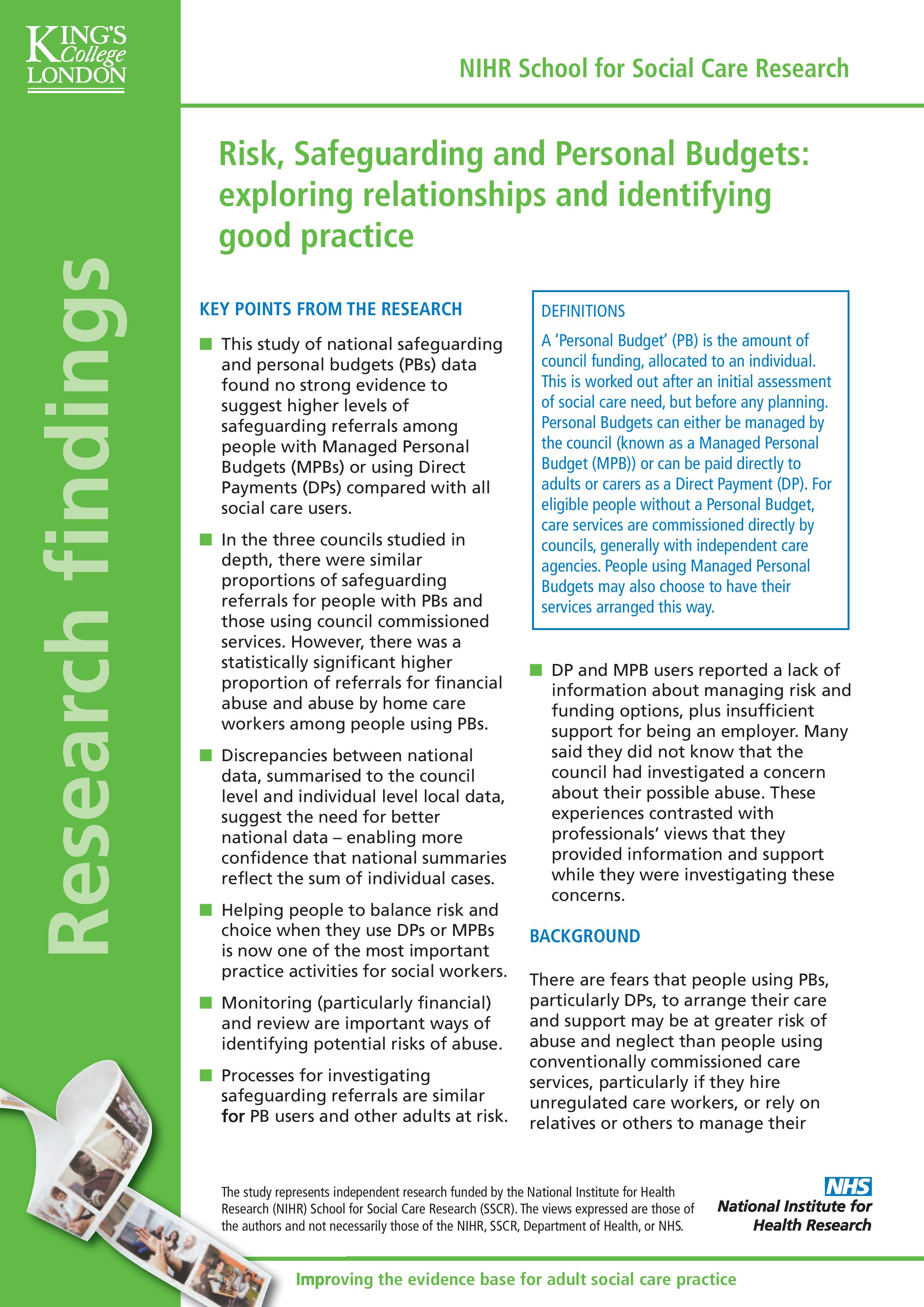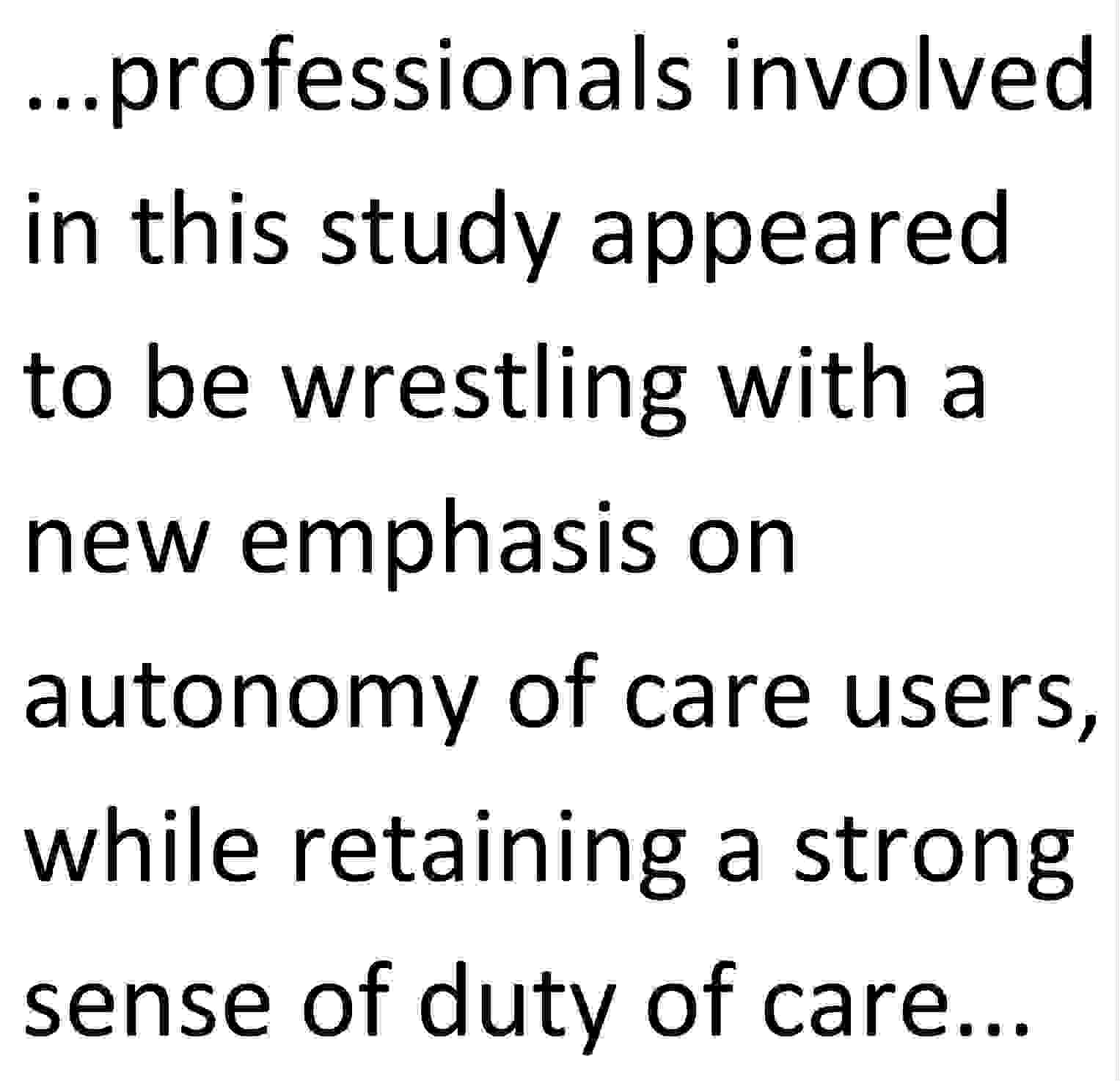 Dr Martin Stevens is Senior Research Fellow at the Social Care Workforce Research Unit in the Policy Institute at King’s. (900 words)
Dr Martin Stevens is Senior Research Fellow at the Social Care Workforce Research Unit in the Policy Institute at King’s. (900 words)
Published today are our findings from this timely NIHR-SSCR funded study, which aimed to provide evidence about the impact of using different forms of Personal Budgets on risks of abuse, to explore practice responses to the increased emphasis on using Personal Budgets and the experiences of Personal Budget holders who had been the subject of a safeguarding referral (suspected abuse or neglect). This collaborative research (undertaken by researchers from King’s, the University of York and Coventry University) was driven by our awareness of contradictory perceptions held by practitioners and other researchers. We had heard views that people on Direct Payments (one main form of Personal Budgets) were more at risk of abuse than other social care users, but on the other hand that the increased control offered by Direct Payments was a protective factor. In order to provide some evidence to address these contradictions, we re-analysed national and local data on safeguarding referrals and take-up of the different forms of Personal Budget.
DEFINITIONSA ‘Personal Budget’ is the amount of council funding allocated to an individual. This is worked out after an initial assessment of social care need, but before any planning. Personal Budgets can be either managed by the council (known as a Managed Personal Budget) or paid directly to adults or carers as a Direct Payment. For eligible people without a Personal Budget, care services are commissioned directly by councils, generally with independent care agencies. People using Managed Personal Budgets may also choose to have their services arranged this way. |
The study also explored the perspectives of managers, social workers, people using council-funded social care and family carers about the impact of Personal Budgets on safeguarding (keeping people safe from abuse and neglect). We talked to all these groups to understand any related practice changes.
Key findings
Our analysis of national safeguarding and personal budgets statistics found no strong evidence to suggest higher levels of safeguarding referrals among people with Managed Personal Budgets or using Direct Payments compared with all other social care users. In the three councils studied in depth, there were similar proportions of safeguarding referrals  for people with Personal Budgets and those using council commissioned services. However, we found a statistically significant higher proportion of referrals for financial abuse and abuse by home care workers among people using Personal Budgets. However, discrepancies between national data, summarised to the council level and individual level local data, suggest we need better national data to be more confident that national summaries reflect the sum of individual cases.
for people with Personal Budgets and those using council commissioned services. However, we found a statistically significant higher proportion of referrals for financial abuse and abuse by home care workers among people using Personal Budgets. However, discrepancies between national data, summarised to the council level and individual level local data, suggest we need better national data to be more confident that national summaries reflect the sum of individual cases.
Helping people to balance risk and choice when they use Direct Payments or Managed Personal Budgets is now one of the most important practice activities for social workers. Monitoring (particularly financial) and review are important ways of identifying potential risks of abuse. Processes for investigating safeguarding referrals are similar for Personal Budget users and other adults at risk and this is helpful to minimise the risk of abuse and neglect.
People using Direct Payment and Managed Personal Budgets to pay for their care and support reported a lack of information about managing risk and funding options, plus insufficient support for being an employer. Many said they did not know the council had investigated a concern about their possible abuse. These experiences contrasted with professionals’ reports that they provided information and support while they were investigating such concerns.
Implications for practice
We found that some of the fears expressed by practitioners and managers may have been overstated. However, it is possible that the analysis of national data may have missed some important impact of Personal Budgets on safeguarding referrals. These might only emerge following analysis of data based on individual records. Alternatively, practitioners may have pre-empted risk by restricting opportunities for Direct Payments. Discrepancies between findings based on summary and individual council level analysis highlight the need for individual level data to be included in national datasets. We need this to be able to draw more reliable conclusions about relationships between personalisation (here defined as receiving a Managed Personal Budget or Direct Payment) and safeguarding referrals.
 Failing this, more research is needed, based on a nationally representative sample of individual referral records. This would help us see whether the different patterns of abuse amongst those using Personal Budgets included in our sample are valid nationally.
Failing this, more research is needed, based on a nationally representative sample of individual referral records. This would help us see whether the different patterns of abuse amongst those using Personal Budgets included in our sample are valid nationally.
Our study provides evidence of a reworking of traditional relationships between social workers and people using services, although the numbers interviewed were small. The professionals involved in this study appeared to be wrestling with a new emphasis on autonomy of care users, while retaining a strong sense of duty of care. This may be a variant of the familiar balance between ‘care and control’, but still suggests the need for focused training, effective supervision and support when things go wrong. While professionals reported giving information about funding options, reporting problems and offered support with employing Personal Assistants, the general low awareness about employment relations among people with Personal Budgets and their families and their feelings of lack of support, suggest that more emphasis on these elements would be useful. The study supports the continued need for well-trained professional involvement in safeguarding, given the complexity of some of the judgements that need to be made, especially in interpreting the relative importance of family dynamics and other relationships as pointers to potential abuse.
Dr Martin Stevens is Senior Research Fellow at the Social Care Workforce Research Unit in the Policy Institute at King’s. Follow @MartinStevens2.
About this project
This study was funded by the NIHR School for Social Care Research and ran from 2012 to 2014. The Principal Investigator was Dr Martin Stevens of the Social Care Workforce Research Unit at King’s College London. Prof Jill Manthorpe, Dr Shereen Hussein and Dr Kritika Samsi, also from the Unit, were researchers on the study, as were: from Analytical Research Ltd, Mohamed Ismail; from Coventry University, John Woolham; and, from the University of York, Kate Baxter and Fiona Aspinal.
Risk, Safeguarding and Personal Budgets project page on the Social Care Workforce Research Unit website.
Stevens, M., Manthorpe, J., Hussein, S., Ismail, M., Woolham, J., Samsi, K., Baxter, K. & Aspinal, F. (2014) ‘Risk, Safeguarding and Personal Budgets: exploring relationships and identifying good practice. Research Findings’, London: NIHR School for Social Care Research.